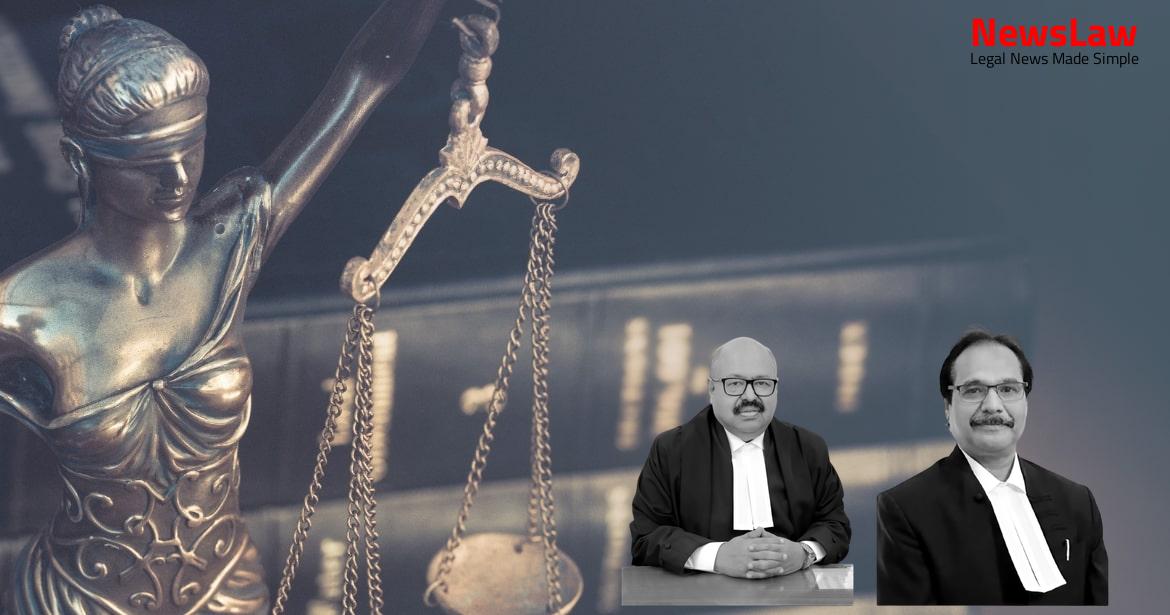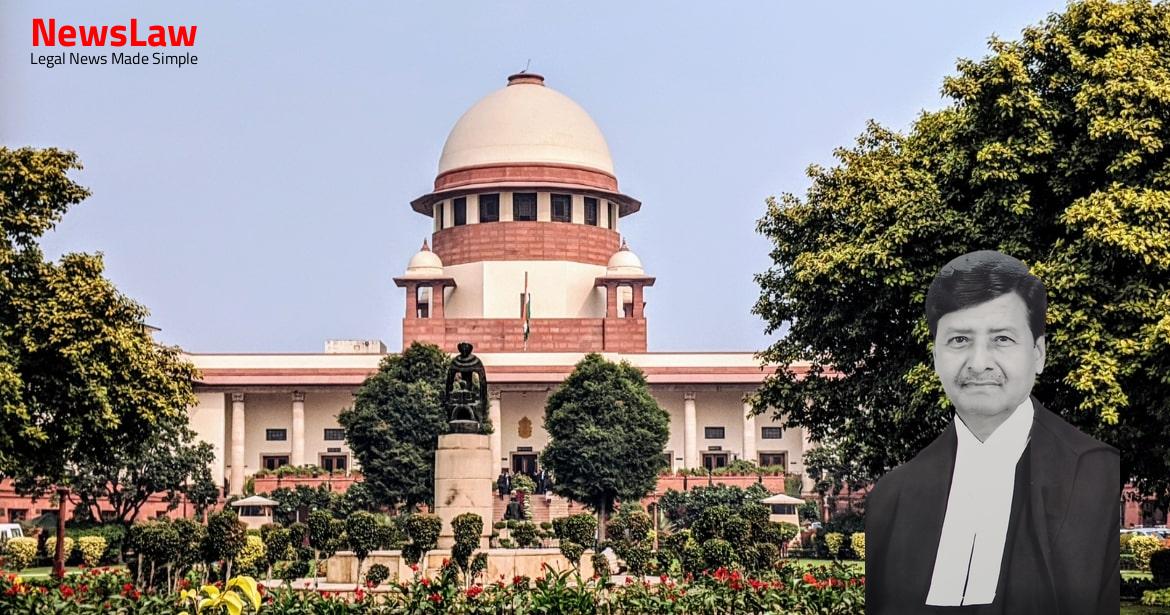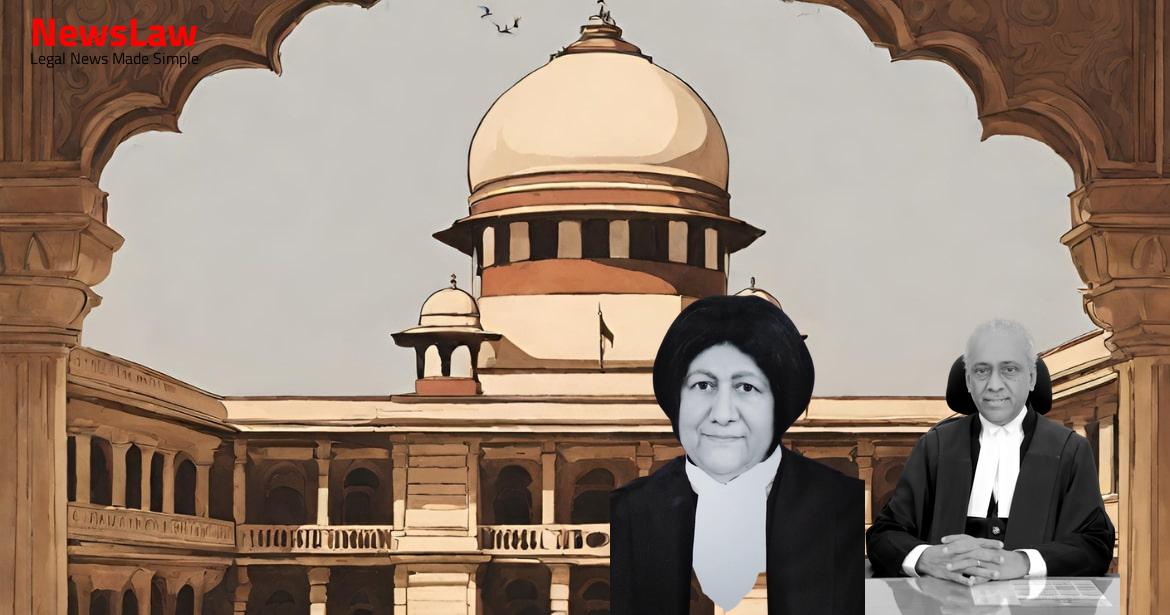The legal battle between Avitel Post Studioz Ltd. and HSBC revolves around the enforcement of a foreign arbitral award. The case delves into the complexities of bias and public policy in international arbitration. Stay informed about the latest developments in this significant legal dispute.
Facts
- The challenge in these appeals is to the order dated 25.04.2023 in the Arbitration Petition No 833 of 2015 and Notice of Motion No 2475 of 2016 facilitating the enforcement of the final Award dated 27.09.2014.
- The final award issued in the SIAC Arbitration No 088 of 2012 directed the appellants to pay US$ 60 million as damages for fraudulent misrepresentations.
- The appellants failed to abide by the direction to deposit the amount, leading to a contempt proceeding being initiated against them.
- On 11.07.2022, the appellants were directed to remain present before the Court after it was found that they deliberately and willfully disobeyed the Court’s order.
- Appellant No 2 is the founder of Avitel Post Studioz Limited, serving as its Chairman and Director, while Appellant Nos. 3 and 4 are his sons and directors of Appellant No 1.
- On 21.4.2011, a Share Subscription Agreement was signed between HSBC and Avitel India, where HSBC invested US$ 60 million to acquire 7.8% of its paid-up capital.
- After the investment, the appellants allegedly stopped providing information about the contract with BBC, leading to follow-up attempts by HSBC.
- Emergency arbitrator issued interim Awards in favor of HSBC, directing the appellants to refrain from disposing of assets up to US$ 50 million.
- It was revealed that the purported BBC contract was non-existent, and the invested amount was diverted to different companies.
- HSBC invoked the arbitration clause under the SIAC Rules on 11.05.2012, claiming damages of US$ 60 million from the appellants.
- Appellant No 1, Avitel Post Studioz Limited, is an Indian company and parent company of Avitel Group.
- Appellants challenged the arbitration proceedings but were rejected, leading to direction to deposit US$ 60 million for award enforcement.
- The dispute involved allegations of fraud, which the appellants claimed as non-arbitrable under Indian law due to serious criminal offenses.
- Appellant Nos. 2 to 4 defied court directions, leading to warrants, look-out notices, and Red-Corner Notice issuance.
- The objection to enforcing the foreign Award under Section 48 of the Indian Arbitration Act was rejected by the High Court, with continued attachment order against the appellants.
- Appellants surrendered later, offering unconditional apology which the court refused to accept, leading to imprisonment.
- HSBC accused the appellants of attempts to delay and frustrate the proceedings during the arbitration.
- A Shareholders’ Agreement was entered between the parties in June 2011, defining their relationship and containing an identical arbitration clause.
- The appellants represented at a later stage that the US$ 60 million investment was needed for a significant contract with BBC.
- Emergency Arbitrator amended the Interim Awards on 27.7.2012, granting further relief to HSBC by rejecting investigations into Avitel Dubai and Avitel Mauritius.
Also Read: Insurance Claim Repudiation due to Fire Incident: Court’s Legal Analysis
Issue
- The issue at hand is whether the High Court correctly rejected the objection under Section 48(2)(b) of the Indian Arbitration Act against enforcement of the foreign Award.
- This leads to the question of whether the ground of bias can be raised at the enforcement stage under Section 48(2)(b) for being violative of the public policy of India and the basic notions of morality or justice.
- India is an early signatory to the New York Convention, which adds to the complexity of the issue.
- The core consideration is the validity of rejecting the objection based on arbitral bias and violation of public policy as grounds for non-enforcement.
Arguments
- The High Court was argued that bias could not be raised under the concept of ‘public policy of India’
- The SLP mentioned considering the effect of the dictum of the five-judge bench in NN Global Mercantile Private Ltd. v M/s Indo Unique Flame Ltd delivered on 25.04.2023
- Allegations were made by the Award Debtors regarding the compromised independence and impartiality of the Presiding Arbitrator, Mr. Christopher Lau, as per General Standard 3 of the IBA Guidelines
- It was contended that Mr. Lau failed to disclose his conflict of interest, making the Award unenforceable as per Section 48(2)(b) of the Indian Arbitration Act
- Counsel for appellants referred to the IBA Guidelines on Conflict of Interest in International Arbitration to argue against the enforcement of the Award
- An additional challenge under Section 48(1)(b) of the Indian Arbitration Act was attempted by the appellants, relating to ‘inability to present their case’
- Discussion on the Stamp Act,1899 and its purpose to protect revenue, suggesting not to arm litigants with technicalities
- Submissions were made to demonstrate that no disclosure was required from the arbitrator at the enforcement stage
- Details provided on Mr. Christopher Lau, who is an independent non-executive Director of Wing Tai and Chairman of their Audit and Risk Committee
- Respondent argued that the enforcement of the award cannot be refused based on arbitral bias.
- The enforcement of the award should not be considered contrary to public policy as per Section 48(2)(b) of the Indian Arbitration Act.
- Respondent reiterated their contention against enforcing the award on grounds of arbitral bias.
Analysis
- Objection of bias must be first raised in the country of origin of the award before being raised at the time of enforcement.
- In India, the public policy exception should be interpreted extremely narrowly with an internationally recognized standard of bias.
- Courts should consider international best practices instead of domestic standards when determining bias.
- Enforcement of foreign arbitral awards can be denied on public policy grounds only if it violates the forum state’s most basic notions of morality and justice.
- National courts should not apply domestic standards of independence and impartiality without considering their international context when denying recognition of an award under Article V.
- The New York Convention does not explicitly mention bias, but possible grounds for refusal of recognition of a foreign award include irregular composition of arbitral tribunal, due process, and public policy defense.
- Courts worldwide have a higher threshold for bias in preventing enforcement of awards than in ordinary judicial review.
- Recommendations by the International Law Association advocate using narrow and international standards for ‘public policy’ in international commercial arbitration.
- Courts in different jurisdictions have varied standards for bias, such as the ‘informed or fair minded observer’ test in English courts and the ‘reasonable suspicion’ standard in Singapore.
- Minimal judicial intervention in a foreign award is the norm with interference only based on exhaustive grounds mentioned under Section 48 of the Indian Arbitration Act.
- The outcome of a challenge on bias would vary depending on domestic standards, and a foreign award can be refused enforcement on bias ground in certain cases.
- The Supreme Court of India underscored minimal judicial intervention in foreign awards and noted that interference should be based on clear violations of ‘public policy’ specific to India.
- Pro-enforcement bias is a principle entrenched in the Indian legal system, where interference in foreign awards is limited to exceptional cases of blatant disregard of Section 48.
- Courts applying their own public policy to Convention Awards should give it an international dimension, not a domestic one.
- The New York Convention’s objectives discourage reliance on local public policies without international limitations.
- Article V(2) of the New York Convention outlines reasons for refusal of recognition and enforcement of an arbitral award.
- The New York Convention replaced the Geneva Convention of 1927 to streamline the process of enforcing foreign Arbitral Awards.
- The Geneva Convention allowed for refusal based on violation of ‘fundamental principles of the law’, while the New York Convention focuses on public policy of the country where enforcement is sought.
- The scope of invoking public policy as a ground for refusal is narrower under the New York Convention compared to its predecessors.
- Lord Denning’s quote emphasizes the importance of having a competent authority to control the unruly nature of the ‘public policy’ ground in arbitration cases.
- The analysis focuses on the challenges faced by the award holders despite the award being in their favor.
- The arbitrator’s duty to disclose any potential conflict of interest is highlighted, along with the importance of impartiality and independence.
- The IBA Guidelines are referenced, indicating the standards and requirements for arbitrators.
- The High Court’s conclusions regarding bias allegations against Mr. Christopher Lau are discussed, emphasizing the lack of evidence supporting bias.
- Various legal proceedings and challenges faced by the award debtors are outlined, including contempt proceedings and enforcement issues.
- The significance of timely challenges to arbitral appointments is underscored to prevent strategic delays in the enforcement process.
- The need for applying international standards in determining bias and ensuring enforcement unless there is a clear violation of morality and justice is emphasized.
- The High Court rightly held that the award-debtors failed to prove bias, conflict of interest, or failure of disclosure by the Presiding Arbitrator as grounds for objection to enforcement.
- The award-debtors did not meet the high threshold for refusal of enforcement under Section 48 of the Indian Arbitration Act.
- The High Court’s decision for the enforcement of the foreign award was approved, indicating adherence to international standards is essential for the refusal of enforcement.
- The appeals by the award-debtors were dismissed, upholding the enforcement decision.
- The victory in legal battles so far does not imply winning the war for the respondents.
Decision
- The appeals have been dismissed as they were found devoid of merit.
- Early enforcement of the foreign award by the competent forum is emphasized without further indulgence to the award debtors.
- Any pending applications are to be closed as per the order.
Case Title: AVITEL POST STUDIOZ LIMITED Vs. HSBC PI HOLDINGS (MAURITIUS) LIMITED (PREVIOUSLY NAMED HPEIF HOLDINGS 1 LIMITED) (2024 INSC 242)
Case Number: C.A. No.-003835-003836 / 2024



